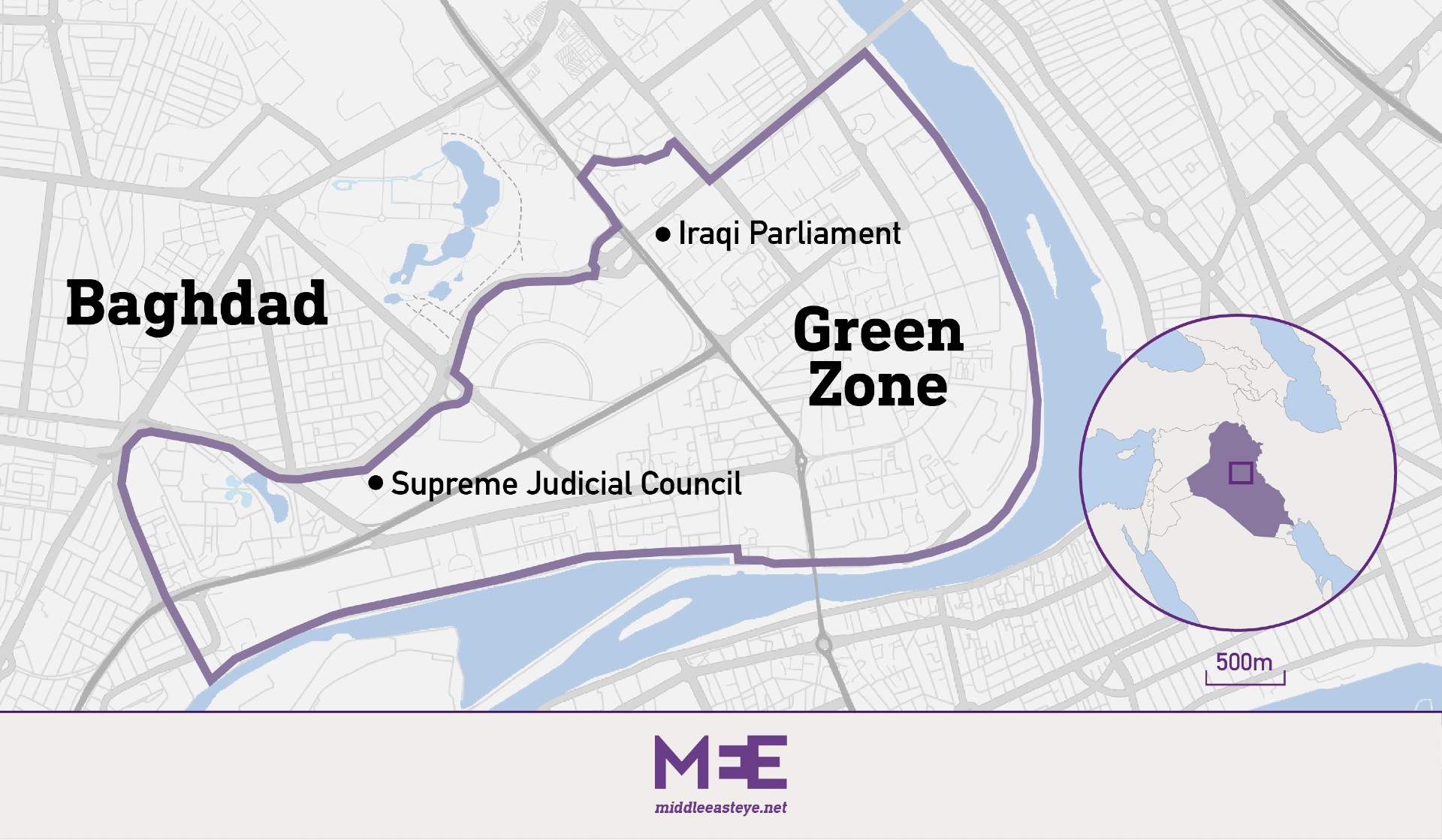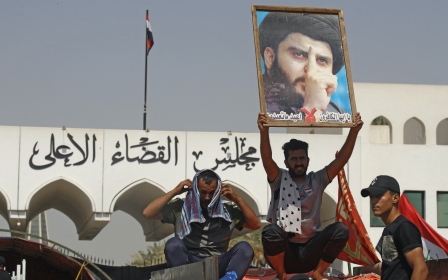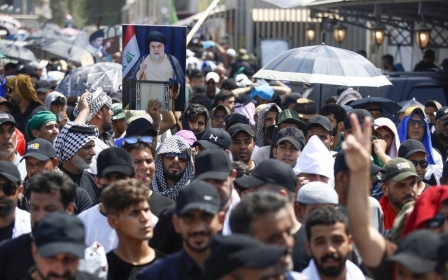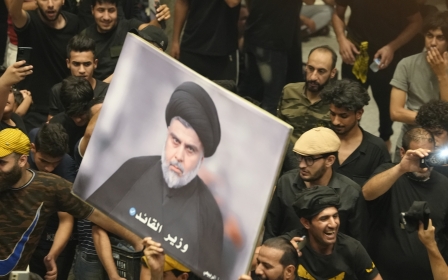Iraq: Sadr supporters run riot in Iraq after cleric's 'retirement' from politics
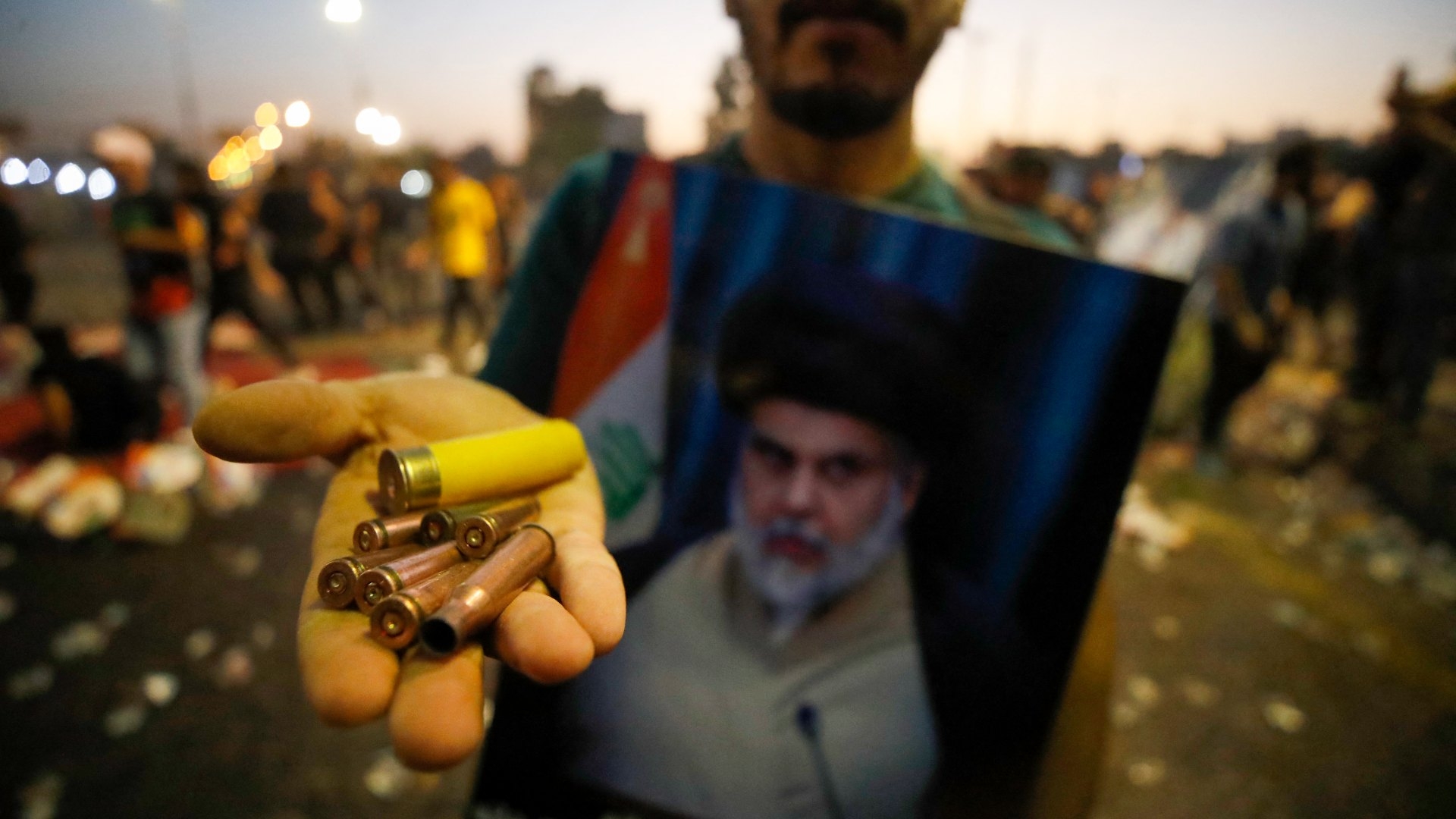
At least eight people have been killed as supporters of Muqtada al-Sadr continue to protest in Baghdad and across Iraq's south, following the cleric's announcement of his "definitive retirement" from politics and the closure of most of his offices and institutions.
Rockets were landing inside the Green Zone in Baghdad late on Monday night, including near the parliament building, with heavy gunfire also heard in the southern city of Basra.
Popular Mobilisation Authority (PMA) headquarters, a governmental paramilitary umbrella group that includes Sadr's Iran-backed rivals, was struck by RPG7 rocket fire.
The headquarter of Saraya al-Salam, a militia linked to Sadr, was also attacked by rockets and gunfire. Several offices of MPs linked to the Iranian-backed Coordination Framework - an umbrella group of parties opposed to Sadr - were also attacked.
Sirens were triggered when one shell landed near the US embassy in Baghdad.
New MEE newsletter: Jerusalem Dispatch
Sign up to get the latest insights and analysis on Israel-Palestine, alongside Turkey Unpacked and other MEE newsletters
Sources confirmed to Middle East Eye that Muqtada al-Sadr has gone on hunger strike until the use of violence and weapons comes to an end. A commander from Saraya al-Salam told MEE: "Everything will be calm soon. By an hour or two the news [of the hunger strike] will reach all our fighters and everyone will go back home."
Hadi al-Amiri, secretary of the Badr Organization, appealed for an end to the violence: "We call for calm, and I appeal to my sons from all sides to stop using weapons."
A security official told Middle East Eye that one Sadr supporter was killed after security forces attempted to push back against demonstrators who broke into government buildings. Hospital sources confirmed to MEE that eight protesters in the Green Zone had succumbed to their injuries by late Monday night.
The White House said the unrest in Iraq was "disturbing", and called for dialogue - adding that Washington had no immediate plans to evacuate staff from its embassy.
In a statement on Twitter on Monday, Sadr said he had "decided not to interfere in political affairs, so now I announce my final retirement and the closure of all institutions except for the Holy Shrine, the Noble Museum and the Al-Turath Authority".
Following the announcement, Sadr supporters began marching towards government buildings in the Green Zone, the heavily fortified district of Baghdad that holds the parliament and other key institutions and embassies.
Footage and photos on social media appeared to show his supporters climbing the gates outside the Monument of the Unknown Soldier and breaking into the Republican Palace buildings. Some photos showed Sadrists swimming in the palace's pool.
Local media reported that the protesters chanted "the people want the fall of the regime", a slogan that was originally associated with the region's 2011 Arab Spring anti-government protests.
A senior military officer in the Green Zone told MEE that 20 security personnel were wounded as they confronted demonstrators.
Forces associated with Sadr's Saraya al-Salam armed faction were also seen en route to the Green Zone.
"We have not decided our next step yet. What is currently unfolding is the personal will of the demonstrators. There is no decision to do anything so far," a prominent Saraya al-Salam commander told MEE early on Monday afternoon.
'If this is not planned [between Sadr and his supporters], everything will be over by tomorrow, but if chaos spreads and the government fails to restrain them then we will certainly intervene'
- Coordination Framework source
"Over the next few hours, we will determine our destination and the mechanisms required to implement it. Sadr's decision to stay away does not mean that we will back down."
Prime Minister Mustafa al-Kadhimi said he had directed the cabinet to suspend its sessions until further notice after protesters broke into its office.
Sadr's followers have in recent weeks been occupying the area around the parliament building in an attempt to push for new elections in the country.
The country has been gripped by political deadlock since poorly attended elections in October 2021, which have so far yet to result in a new government.
Sadr's MPs, who won the highest number of seats in that election, resigned in June after negotiations to form what he called a "majority government" failed.
A further statement put out by Sadr's office on Monday - after his resignation - said that from now on it was "strictly forbidden to raise slogans, flags, political chants and others in the name of the Sadrist movement" and that Sadrists would not be involved in media or social media activities.
According to local media, Sadr's supporters also stormed the provincial government building in the southern Dhi Qar governorate. They also reportedly did the same in the Wasit and Maysan governorates - graffiti adorning the Maysan governorate building appeared to read "closed by the order of the people".
Iraq's security forces announced the imposition of a curfew across the capital from 3.30pm and closed off the entrances to Baghdad governorate. This was later expanded, with all governorates placed under curfew from 7pm.
They also called on Sadr's supporters to "withdraw immediately" from the Green Zone and called for restraint in order to "prevent clashes or the spilling of Iraqi blood".
One member of the Coordination Framework, the alliance of Iran-backed Shia parties that has become Sadr's staunch opponent, on Monday afternoon said its forces would not "interfere" in the latest Sadrist actions.
"We are waiting for government measures to deter them - we think this is an outburst of anger in reaction to Sadr's withdrawal. We don't think they will do anything more than create chaos for a day or two," one prominent member of the Framework told MEE.
"If this is not planned [between Sadr and his supporters], everything will be over by tomorrow, but if chaos spreads and the government fails to restrain them then we will certainly intervene."
Sadr, who once led armed forces opposed to the US occupation of Iraq, has over the past two decades been one of the most powerful political forces in the country.
He had established himself as a nationalist and opponent of the establishment, despite many of his followers holding senior government positions.
Sadr's father, Mohammed Sadiq, and relative, Mohammed Baqir, were both highly influential clerics, and their faces adorn placards and banners of Sadrists and other religious and political factions in Iraq. Both were killed by Saddam Hussein and are regarded as martyrs and advocates of the poor by many Shias.
Some online appeared sceptical about the finality of Sadr's announcement.
"Sadr announces his retirement from politics for almost the 10th time. As usual, he'll be back in no time," tweeted Zeidon Alkinani, a non-resident fellow at the Arab Center Washington DC.
Suadad al-Salhy reported from Baghdad and Alex MacDonald reported from London.
Middle East Eye delivers independent and unrivalled coverage and analysis of the Middle East, North Africa and beyond. To learn more about republishing this content and the associated fees, please fill out this form. More about MEE can be found here.


